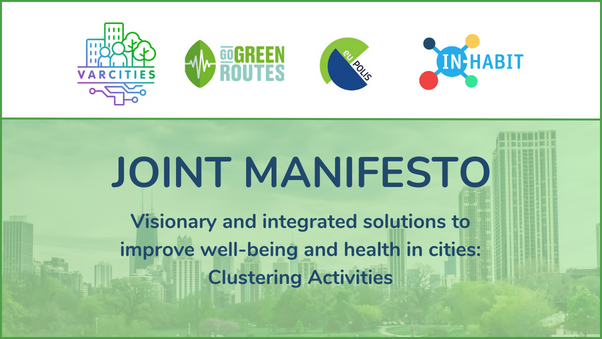
IN-HABIT launches business incubation programme in its four cities
January 20, 2023
IN-HABIT lanza un programa gratuito para fomentar emprendimiento
January 24, 2023IN-HABIT, GoGreenRoutes, VARCITIES, and euPOLIS have developed a joint manifesto calling on European cities to launch initiatives that offer visionary and integrated solutions at the intersection of social, cultural, digital, and nature-based solutions to increase the health and well-being of citizens.
IN-HABIT, GoGreenRoutes, VARCITIES, and euPOLIS have developed a joint manifesto calling on European cities to launch initiatives that offer visionary and integrated solutions at the intersection of social, cultural, digital, and nature-based solutions to increase the health and well-being of citizens.
The joint manifesto focuses on five key areas: nature-based solutions; health and sustainable urban areas; culture and arts; gender, inclusion, and diversity; and digital innovation. In each of these areas, the sister projects outline the current context, the latest research, guidelines, and initiatives, and the actions to be taken.
Considering nature-based solutions, the manifesto argues that addressing issues of environmental justice and universal access to green spaces is crucial to achieving healthy urban environments, that architectural and urban development should be based on health and well-being as a starting point, and that policies must be geared towards building prosperous, liveable, and resilient cities.
In terms of healthy and sustainable urban areas, the sister projects emphasise the importance of an inclusive approach for re-naturing cities: health-related and NBS interventions should develop true opportunities for participation and empowerment, building communities’ resilience and social sustainability, and policy makers should promote innovation hubs to engage citizens as well as promoting sustainable local solutions for more inclusive communities.
Culture, arts, and heritage are described as undervalued resources that should be researched and promoted: policies should be developed that capitalise on cultural diversity as a resource for sustainable living and promote an inclusive and equitable ecosystem that values the contribution of those working in the culture, arts, and heritage sectors. The manifesto also notes the importance of keeping cultural heritage alive, as it is both an asset and a strategic living resource.
Regarding gender, inclusion, and diversity, the four sister projects call for a greater commitment to continue fighting the gender gap, supporting women’s empowerment, and promoting women’s participation in the digital economy. The projects will work to ensure the promotion of diversity, equity, and inclusion strategies by considering individual characteristics and circumstances, through fair stakeholder participation in engagement activities.
Finally, on digital innovation, the manifesto calls for cities to commit to providing transparency and consistency through the provision of data and information on social dimensions via openly accessible platforms. It also acknowledges a need to better support Micro-, Small, and Medium-sized Enterprises’ (MSMEs) digital transformation to strengthen their capacities in applying sustainable business practices.
The manifesto concludes with an action plan – outlining the sister projects’ shared vision for future actions – and commitments from the four sister projects to achieving a series of bespoke visionary solutions to promote health and well-being in urban conurbations.
To find out how where IN-HABIT and its sister projects are operating you can take a look at the map.




